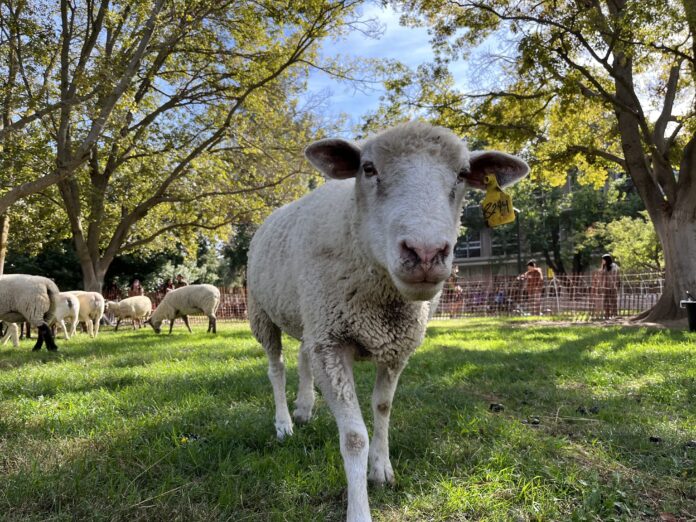UC Davis study finds that sheep mow and fertilize urban lawn landscapes while decreasing students’ stress levels
By KATIE HELLMAN — science@theaggie.org
For the past two years, 25 UC Davis sheep have been released from their barns seasonally to graze at various parts of campus. These sheep not only provide ecological benefits, but they also improve the mental health and stress responses of students.
Haven Kiers is the lead author of the new study, which was published in The International Journal of Environmental Research and Public Health in January. Kiers is also the director of the sheepmowers project and an assistant professor of landscape architecture in the College of Agricultural and Environmental Science. She surveyed around 200 students with the help of co-authors and additional researchers.
“We noticed that people were just really happy when the sheep were around,” Kiers said. “It boosted their mood and people were starting to say that when the sheepmowers were out, they would come by before an exam to destress, or if they were already stressed they would come and sit [by the sheep].”
Caroline S. Dewa of the UC Davis Department of Public Health co-authored the paper and further commented on the benefits the sheep provided to students.
“For some people, it was an incentive to go to class because they knew if they went to class, after class, they would see the sheep,” Dewa said. “For others, it was a place to relax and chill out after their class.”
To gather data for the study, student employees and student shepherds interviewed participants in person and through social media. Comments were gathered and grouped into themes that included community engagement, place identity, relaxation and academic stress reduction.
These students were found to have a notably lower likelihood of feeling “very stressed” or “stressed” when in the presence of the sheep compared to those who were not exposed to the animals.
“Since the 1980s, college students in the U.S. have self-reported a decline in their physical and emotional health,” the study reads. “[The results] highlight the potential value of nature-based animal-assisted interventions on campus as a strategy for improving students’ mental health and well-being.”
This tradition with sheep mowing, which includes Suffolk, Hampshire, Southdown and Dorset breeds, began in 2021 amid COVID-19 masking and social-distancing protocols. The sheepmowers program’s intention was to determine if there was a correlation between grazing sheep and the health of urban lawn landscapes so that they could be utilized more frequently on campus.
“We are looking at the benefits of using sheep as lawnmowers from multiple aspects,” Kiers said. “We started looking at operational aspects: do they save time compared to lawnmowers? Can they cut the grass as well as lawnmowers? Can they reduce the amount of labor needed, and can they get into areas where traditional groundskeepers can’t?”
Kiers also explained that using sheep to maintain and fertilize the landscape is ecologically favorable.
“We’re looking at sustainability and seeing whether the sheep can help fertilize the grass and the soil, whether we can reduce the need for pesticides and herbicides, and also we’re looking…to see if [the sheep] are actually attracting beneficial insects and bringing in the potential for more biodiversity,” Kiers said.
The sheep also reduce the number of harmful pollutants emitted into the atmosphere by lawnmowers.
“It’s a way of controlling the grass that’s beneficial to the environment,” Dewa said. “[The sheep] don’t pollute, in the same sense, as a piece of machinery might.”
The sheepmowers program also benefits those that aren’t able to visit the sheep in-person. An Instagram account and live “sheep cam” allow people to view them virtually, and there is also a website that showcases the study, the researchers and, of course, the sheep.
“I just love seeing people’s reactions to the sheep,” Kiers said. “I love watching people bike by and just stop and look. People sort of come together and rally around it. I really like that.”
Written by: Katie Hellman — science@theaggie.org




